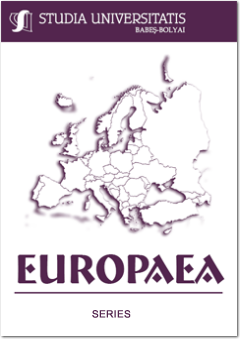GERMAN PERCEPTIONS OF EUROPE BEFORE AND AFTER 1989/90
GERMAN PERCEPTIONS OF EUROPE BEFORE AND AFTER 1989/90
Author(s): Wolf D. GrunerSubject(s): Politics / Political Sciences
Published by: Studia Universitatis Babes-Bolyai
Keywords: The triad Federation – Lander (States) – Europe; Federalism vs. Centralism; German question – German problem; The new German question; Federative nation.
Summary/Abstract: This article is discussing the German perceptions of Europe before and after German unification (1945-2018). It reflects and comments the complex transformations of Germany in Europe from the end of the Second World War, the foundation of two states in Germany, the dilemma of the Federal Republic of Germany working for European unity and reuniting the German nation and the restoration of German unity in 1990. After 1990 the greater Germany has to deal with the double task of domestic integration, i.e. the integration of the two Germanys into one nation, and at the same time promoting the process of the European unity project. At the European level since 2000/2001 the “new German question” returned to the agenda. How will the strongest European economic power deal with economic and financial crises and institutional reforms of the EU. Long-term phenomena and features of the history of the Germanys and more recent developments come into focus. For understanding German perceptions of Europe we have to take into account the historical traditions of Germany federalism over the centuries as well as the German experience of three hyper inflations in the 20th century (1923/24 – 1948 – 1970s). Until 1995 Germany was the only federation in the EC/EU. Therefore between 1950 und 1993 the triad Federation-Lander-Europe play an important role, i.e. the rights and obligations of the Lander and the Federation in European affairs. In the period before 1989/90 Germany’s neighbours had to deal with the German problem, i.e. how to contain and integrate West Germany into the European integration process of the European democracies. Across all party lines the German political elites after the experience of National Socialist Germany opted for some kind of federal system for a united Europe. Examples for their ideas on Europe are given – the social democrats Hoegner, Schmid, Erler, the communists Grotewohl and Hanstein, the Christian democrats Ehard, Adenauer and von Weizsäcker, the Free Democrats Genscher and Scheel and the role of German members to the Consultative Assembly of the Council of Europe and to the European Parliament. Special sections are dedicated to the differing views of Walter Hallstein the long-term president of the European Commission and Franz Josef Strauß long-term member of the German Bundestag, Minister of Defence and Prime Minister of Bavaria. After the mid-1990s the finality of Europe is discussed. Quite valuable are the speeches of the German presidents to the European Parliament and the active cooperation of the German members to establish a Human Charter and a European Constitution. In the debates on how to deal with the Euro crises and Greece after 2008/9 the new German question returned and the stereotype image of the “ugly” German with a swastika and Angela Merkel with a Hitler-moustache. What kind of responsibility can and should Germany assume? Should it, being the strongest economic power in the EU, take on the role of the “leader”? Some observers speak for German leadership, others fear a “German Europe”. The majority of the Germans are prepared to support necessary institutional reforms.
Journal: Studia Universitatis Babes-Bolyai - Studia Europaea
- Issue Year: 63/2018
- Issue No: 1
- Page Range: 5-62
- Page Count: 58
- Language: English

